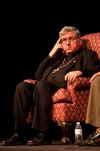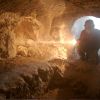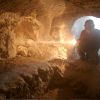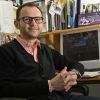Collins urges Catholics to cross Palestinian-Israeli divide
TORONTO - The complexity, heartbreak and bitter politics of the endless Palestinian-Israeli conflict are no reason for Christians to either settle for easy answers or to throw up their hands in despair. The situation calls for Christian charity and solidarity, Cardinal Thomas Collins told a packed theatre in Toronto Sept. 5.
Collins was on hand for the Toronto premiere of the Salt + Light TV documentary Across the Divide. The full-length documentary takes a close look at Bethlehem University — the only Catholic post-secondary institution in the Holy Land — and the trials of fourth-year commerce student Berlanty Azzam. Azzam was caught up in a maze of Israeli military security procedures that saw her detained and prevented from returning to Bethlehem to finish her degree.
Azzam's detention by Israeli forces while she was on her way to a job interview in Ramallah became an international incident in 2009. The case blew up while Salt + Light producer Kris Dmytrenko and a crew were on the Bethlehem University campus making a film about the Christian Brothers and their 39-year-old university just outside Jerusalem.
If the Church has to pick a side, it chooses to stand with the poor and the refugees, said Collins in a panel discussion after the screening. Collins was a participating bishop in the Synod on the Middle East in 2010.
"We have to help them," said Collins, who has spearheaded efforts by Canadian dioceses to sponsor Iraqi refugees displaced by the turmoil in their homeland. "We would prefer, of course, that they can flourish in their home."
The whole point of Bethlehem University is that it is a means for Palestinians — Chistians and Muslims — to flourish where they are, said Robert Smith, the university's vice chancellor. The university's student body is about 70 per cent Muslim and 30 per cent Christian.
"They (graduates) will be trained and professional and committed to build a nation as well as a Church," he said.
Dmytrenko, co-director of Across the Divide, warned against the temptation to name good guys and bad guys in the conflict.
"There's a lot of people suffering on both sides," he said. "It's not a case of who is suffering more."
"People think that all Muslims are terrorists trying to get rid of all Christians. That's not true," said Catholic Near East Welfare Association Canada director Carl Hetu.
As a Maronite Catholic from Lebanon, it was important to Mona Dagher to be at the documentary's premiere.
"I would hope that people will at least know what is going on there," said Dagher.
She praised the film for accurately depicting the lives of Palestinian Christians.
Ajax high school teacher Deanna Wilson said she plans to show the movie to her Grade 12 World Religions class.
"We have an obligation to open our lens to other religions and realities," she said.
She hopes particularly that her comfortable, suburban teens are moved by Azzam's struggle to get an education.
"There are a lot of details I wasn't aware of," said Danny Ferguson at the end of the evening. "It's important to understand the political environment."
"This gets the word out. This gets out the truth and the fullness of the truth," said Smith.
"Our purpose in making this documentary was not to convince. It was simply to tell a story," Salt + Light CEO Fr. Tom Rosica told the audience.
Rosica said he's received calls from committed advocates for both sides in the conflict — Palestinians, Jews and their allies — all equally unhappy with the film. But rather than buying into the rhetoric of the conflict the film strives to accurately fill in the political, economic, social and religious reality Bethlehem University struggles with daily.
WASHINGTON - Paul Loong was determined to survive the POW camps where he was held by the Japanese for three years. While imprisoned, Loong kept a journal that had a chance of surviving him if he never made it out alive.
But Loong did. And he made his way to the United States, got married and had a daughter, Theresa, who accidentally stumbled upon her father's journal. She eventually picked up a video camera and started asking him questions about what he had written when he was in captivity.
The result is an hourlong documentary, "Every Day Is a Holiday," which airs in May and June on public television stations. (Check local listings for dates and times.)
Fr. Michael Prieur has lived at St. Peter’s Seminary in London, Ont., for more than 50 years. For 40 of those years, he never paid attention to the stained glass windows in the chapel.
“And then one day I wondered why St. Jerome was dressed up like a cardinal when there was no such outfit in the days that he lived,” Prieur told The Catholic Register.
The Register’s Resurrection mea culpa
I’m sorry. In writing about a controversial documentary earlier this month (Dramatic Jesus Discovery documentary lacks hard evidence), I never should have brought up the Resurrection in such an offhand way. I should never have imagined the Resurrection could be explained in a single paragraph of a newspaper article.
Simcha Jacobovici’s documentary The Jesus Discovery provocatively asked “what if” a tomb now under an apartment complex in Jerusalem actually contains the bones of Jesus and His family. In my review, I took the bait and posed the question to myself.
Dramatic Jesus Discovery documentary lacks hard evidence
The problem with The Jesus Discovery is that it’s not really about the archeology. It’s about making a documentary movie.
Simcha Jacobovici’s documentary, to be aired in Canada on VisionTV, presents us with a dramatic plot full of twists and turns. Jacobovici turns in a fine performance as the stalwart and stoic hero who patiently overcomes each obstacle on his quest to make a movie. Tight editing and subtle use of music add to the tension.
The story of how the movie got made reveals a great deal about contemporary Israeli society and contemporary American media culture. We’re treated to CNN talking heads sputtering outrage over any information that might challenge their settled world view. We watch as ultra-orthodox Jews in Jerusalem impose their will on the film crew by leveraging mob rule.
TORONTO - Every reporter wants what Martin Himel has — a story that could shift how people think and talk about global politics, a story rich with human drama, suffering, heartbreak and redemption.
Himel found that story among Christian refugees in Toronto and among the huddled and fearful Christians of Cairo and Baghdad where he filmed Persecuted Christians. The hour-long documentary will get its world premiere on VisionTV March 14.
TORONTO - Fr. Tom Rosica knows he’s going to get letters. You don’t wade into the conflict between Palestinians and Israelis expecting bouquets of roses.
Controversy has never been a hallmark of Salt + Light TV. Since its launch in the wake of World Youth Day 2002, Rosica has consciously shaped the digital broadcaster as a voice of hope — clear, Catholic evangelism without the rancor, resentments or fear that so often mar religious television.
Despite efforts at balanced, just-the-facts reporting, Salt + Light’s next big documentary will elicit partisan passion for and against Israel, for and against the Palestinian leadership, when it airs later this year.








